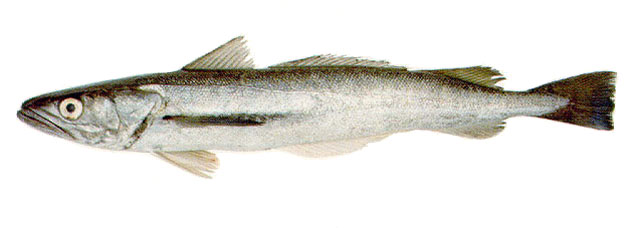| Merlucciidae (Merluccid hakes), subfamily: Merlucciinae |
| 95 cm TL (male/unsexed) |
|
benthopelagic; depth range 50 - 800 m, oceanodromous |
| Southwest Atlantic: off southern Brazil to Argentina and the Falkland Islands up to 54°S (Ref. 47377). |
|
Dorsal spines (total): 1-1; Dorsal soft rays (total): 43-52; Anal spines: 0-0; Anal soft rays: 36-41; Vertebrae: 50-53. Gill rakers short and thick with blunt tips. Pectoral fins relatively short, not reaching level of anal fin origin. Color is silvery with golden luster on back, silvery white on belly (Ref. 1371). |
| Adults inhabit continental shelf depths mainly between 100 and 200 m (Ref. 1371). Larger individuals feed on fish (anchovies, hake, nototheniids, myctophids and Southern blue whitings), squids and macrozooplankton (euphausiids and amphipods); smaller individuals feed on mysids and amphipods (Ref. 1371). Migrate inshore during spring and summer, and offshore into deep water wintering areas after spawning; also undertake diel vertical migrations (Ref. 1371). Sold fresh and frozen. |
|
Not Evaluated
(Ref. 96402)
|
| harmless |
|
Source and more info: www.fishbase.org. For personal, classroom, and other internal use only. Not for publication.
Page created by Jen, 05.08.02,
php script by kbanasihan 06/09/2010 ,
last modified by
dsantos, 20/08/10

